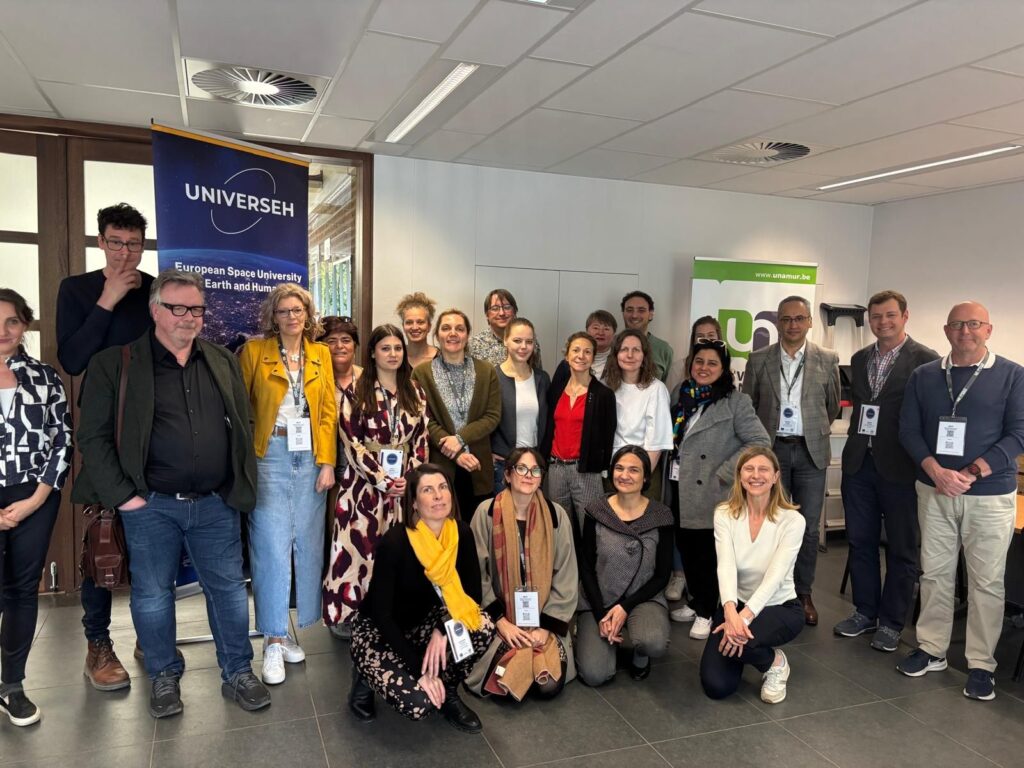But first, what exactly is a Staff Week, and who is it intended for?
A Staff Week, organised under the Erasmus+ Programme, offers a valuable training opportunity for higher education staff to develop professional skills, share best practices, and connect with colleagues from other institutions. Open to both academic and administrative personnel, each Staff Week targets specific groups depending on its theme. Topics may include teaching methods, research and teaching support, international relations, student services, IT, communications, finance, and more.

“Organising Staff Weeks is important for UNIVERSEH because it supports the internationalisation of administrative units across the partner universities and strengthens collaboration among staff.” Isabella Fontana, Head of International Relations at the University of Namur.
These weeks offer a platform to explore key themes and challenges aligned with the Alliance’s goals, while promoting collaboration between institutions and strengthening long-term relationships within the network.
What was the Staff Week about? What did participants talk about?
The UNIVERSEH Staff Week in Namur focused on the theme “Building a Joint Programme: Challenges and Opportunities.”
Participants explored key aspects of designing, implementing, organizing, and adapting joint programmes, with specific attention to assessment methods and quality assurance processes.
The expectations for this Staff Week were closely aligned with the strategic goals of the UNIVERSEH Alliance and the shared ambition to make joint programmes a tangible reality.
Bringing together participants from diverse professional backgrounds – ranging from programme directors and legal advisors to staff in international relations, admissions, quality assurance, and instructional designers allowed participants to better grasp the full complexity of establishing international joint degrees and fostered a deeper understanding of the legal and institutional frameworks governing joint programmes and joint degrees across the seven partner countries.
The main learning objectives were:
- To gain practical insights into the development and management of joint, dual, or multiple degree programmes;
- To exchange practices across institutions on academic and administrative coordination of joint programmes;
- To collaboratively develop innovative approaches through hands-on workshops and scenario-based exercises, such as designing an in-silico joint master’s programme (e.g., Master in Space Sustainability), in particular within the context of the European Universities Initiative.
Key Takeaways from Erasmus+ Pilot Projects Highlight Future of European Degree
During the event, participants reviewed findings from the Erasmus+ pilot projects, leading to several notable conclusions:
- The development of a European degree is seen as a significant step forward for higher education across the continent.
- To maximize its impact, the European degree (or label) should be inclusive—open to all higher education institutions, across all disciplines and fields of study, and accessible to all students.
- The involvement of EQAR-registered quality assurance agencies in the accreditation or evaluation of joint programmes is considered crucial to ensuring quality and consistency.
- A recurring challenge identified was the lack of a legal entity for European University Alliances, with a strong consensus on the need for an EU-level instrument to support and sustain their work.
Key Strategies for Advancing as a European University Alliance
According to participants, the path forward for European University Alliances lies in a strategic and collaborative approach:
- Maintaining a consistent European mindset in all planning and decision-making.
- Identifying opportunities for joint experimentation, particularly around flexible learning pathways that enable institutions to balance immediate societal needs with long-term academic goals.
- Engaging a broad range of stakeholders including faculty, instructional designers, and administrative staff in a collective effort to build sustainable, cross-border academic cooperation.
![]()
What participants thought about the Staff Week – An interview with a participant from HHU, Germany.
How would you describe your overall experience?
I’d say it was interesting and it opened my mind to joint programmes and other topics we covered during the staff week. I feel like I have a much better understanding of these subjects now. As someone who’s still new to UNIVERSEH, the staff week helped me understand the project better and see how diverse the project is – both in its scope and in the ideas it brings together. It helped me understand how things work. I think it’s a great way to quickly get immersed in a project.
“I appreciated the respectful and open-minded atmosphere, where everyone—regardless of age or experience—was treated as a full participant.”
What I really appreciated about this staff week was the level of respect in how people communicate. No matter how new or how young you are, you’re treated as a full participant. That creates a welcoming atmosphere—conversations are open, and people genuinely listen to each other. It’s open-mindedness in a very real, practical sense.
The participants were genuinely driven to make a positive impact—they were active, engaged, and highly motivated.
The staff week is also a human experience?
What I was really looking forward to was finally meeting the people—the faces behind the names I’d been in contact with.
“I found it inspiring to be part of a diverse, intergenerational team where everyone brought unique perspectives and expertise to the table.”
I found it really inspiring to be part of a team with such a mix of ages and backgrounds. There were people with a lot of experience in international coordination, alongside younger professionals who are closer to the student perspective, having just finished their studies. It created a really balanced mix of knowledge and insight. It felt like an expert committee, with everyone bringing something unique to the table from different angles.
“Casual interactions during leisure time helps strengthen personal connections, which in turn improve professional collaboration between universities.”
During the evenings and in leisure time, people can interact more casually, which helps strengthen the connections between universities. In the end, it’s about people connecting with people, and the closer those relationships are, the better the professional interactions become.
Another reason I wanted to join the staff week was to improve my French comprehension and to explore a new city. That’s also the value of mobility itself—travelling to a new place, perhaps somewhere you’ve never been before.
How relevant do you think the content was to your personal or professional goals?
I’d say there was some relevance, although my background is in law, and I work in the law department. Most of the joint programmes discussed seemed to be more focused on the engineering field, which isn’t really my area. Still, it gave me a better sense of what might also be possible in fields like law and economics. You can also reshape your approach to work and education by listening to what matters to people in other fields.
